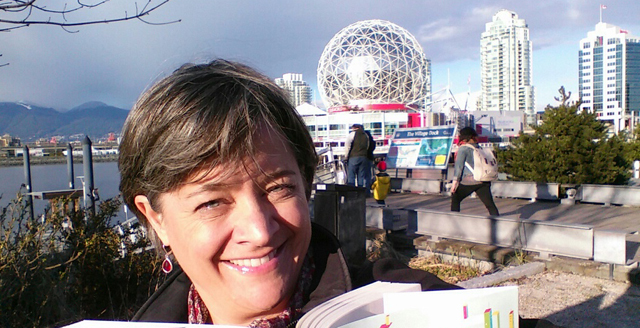Choosing the Happy City: People, Part 3
Choosing the Happy City: People, Part 3

Choosing the Happy City lecture is today at 7 p.m.
Our final interview before the lecture is with Dr. Helena Swinkels, Medical Health Officer with the Fraser Health Authority. Dr. Swinkels is responsible for healthy living and healthy communities for the region and she is Medical Health Officer for the City of Surrey. She has a keen interest in creating physical and social environments that make it easier to live a healthy life. She gets around by transit, walking or bicycling whenever she possibly can.
Dr. Swinkels is going to provide an introduction at the lecture later today. She has some great things to say about how the work of the health authorities is connected with cities, happiness and transportation. So, let’s begin.
What city in the Lower Mainland do you live in? What about work?
I live in Vancouver and work in Surrey.
What makes you happy about where you live or work?
I’ve always wanted to live in a neighbourhood that supports the healthy kind of life. So, I moved to a neighbourhood close to the Main Street SkyTrain station. Now, I can take transit to work, I don’t have to drive, my commute is shorter, and I can walk or cycle in and around my neighbourhood.
For me, it’s very important to live alongside SkyTrain line, because my mother is disabled and she always uses transit to get around.
How do you usually travel around your neighbourhood? How do you travel to work?
In my neighbourhood, you can get around by foot, bike or public transportation. When I travel to work, I almost always take SkyTrain. I did cycle from Surrey to home once and would love to do it again. It took me 2 hours, including a 15-minute stop to pick blackberries along the way. Next time, I’m taking my colleagues with me!
What’s your favourite thing about how you get around your neighbourhood?
I mostly walk and my favourite thing about it is that I run into my neighbours. This is an area for pedestrians and although there are cars there, they are mostly guests.
You speak often about the survey “My Health My Community”. What is that about?
Health stems from where you live, work and play. Recognizing the need for better data about what produces health at local level, the Fraser Health, VCH and UBC created MHMC. This survey will help us work with our community to better promote health. Our aim is to provide communities with actionable health-related data about specific neighbourhoods. The survey collects data about perception of health, stress, lifestyle questions, health care access, and transportation.
The better we understand the relationship between our cities, our health, and our experiences, the better equipped we’ll all be to design cities that are happier, healthier, and more resilient and that will offer a choice on how to travel and how to live. I encourage everyone to go to myhealthmycommunity.org to fill out the survey.
You’ll introduce Charles Montgomery at the lecture today. How is the “happy city” concept connected with your work and lifestyle?
It’s a very important topic. I am particularly interested in how urban form and the transportation system can support health, happiness and meaningful choice in areas that have been built in the era of the car. We know that our ‘suburbs’ are doing some things right. There are compelling reasons to develop denser urban areas in our cities and towns, large and small, suburban and rural – but in doing so, we have to make sure these are built or retrofitted with their residents’ health and happiness in mind.
Also, Charles Montgomery has done a masterful job telling diverse stories in his book. I love good stories!
Finally, what’s the link between health, transportation and happiness?
Most people don’t think of transportation as a health issue but it is hugely important for health. Physical activity you get, amount of air pollution, a number of injuries and social connectedness – these are all greatly affected by transportation. It’s about how we design the cities but also how people get around.
Author: Borjana Slipicevic





